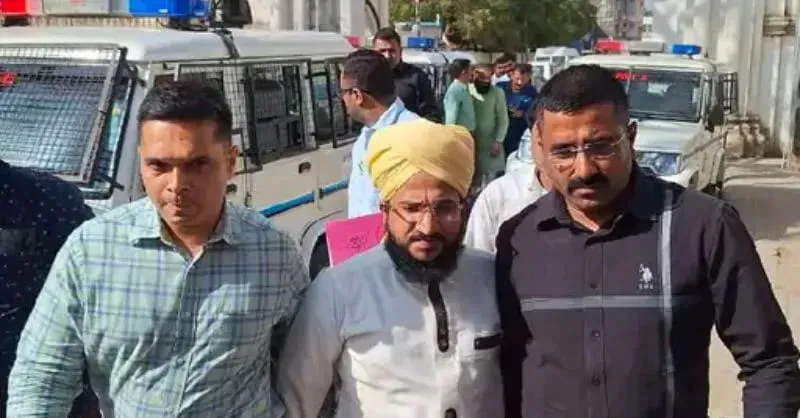Background of the Case
The Gujarat High Court recently dismissed a petition filed by Maulana Mufti Salman Azhari, challenging his detention under the Prevention of Anti-Social Activities Act (PASA). The case is significant as it involves the interpretation and application of PASA, a law enacted to curb anti-social activities that pose a threat to public order. Azhari's detention was based on allegations of inciting communal tension through his speeches and social media posts.
Details of the Allegations
Azhari, a prominent religious leader, was accused of delivering inflammatory speeches that allegedly incited communal discord. The authorities claimed that his actions were likely to disturb public order and peace, leading to his detention under PASA. The specific allegations included promoting enmity between different religious groups and using social media platforms to disseminate provocative content. The detention order was issued following a series of investigations and reports that highlighted the potential threat posed by Azhari's activities.
Arguments Presented by Azhari's Counsel
Azhari's legal team, led by senior advocate Mihir Joshi, argued that the detention was unlawful and violated his fundamental rights. They contended that the speeches and posts cited by the authorities did not amount to a real threat to public order and were protected under the right to freedom of speech and expression. The counsel emphasized that mere apprehensions of disturbance based on speculative grounds could not justify detention under PASA. They also argued that the detention order lacked sufficient evidence and was based on exaggerated claims without concrete proof of any imminent threat.
Prosecution's Stand
The prosecution, represented by advocate Manisha Lavkumar Shah, defended the detention order, asserting that Azhari's actions had a clear potential to incite violence and disrupt communal harmony. They argued that the preventive detention under PASA was necessary to preemptively address threats to public order. The prosecution presented evidence of previous incidents where inflammatory speeches had led to communal clashes, emphasizing the importance of taking proactive measures in such cases. They maintained that Azhari's detention was in the interest of maintaining peace and public order in a sensitive communal environment.
Court's Analysis and Judgment
The Gujarat High Court bench, comprising Justices Sonia Gokani and Hemant Prachchhak, examined the evidence and arguments presented by both sides. The Court analyzed the scope of PASA and its applicability in cases involving preventive detention. They noted that the objective of PASA is to prevent activities that pose a threat to public order and emphasized the need for a balance between individual rights and societal interests.
In its judgment, the Court held that the detention order was justified based on the evidence of Azhari's activities and their potential to disrupt public order. The Court observed that the nature of Azhari's speeches and social media posts indicated a clear intent to provoke communal tension. The bench reiterated that preventive detention under PASA is aimed at preventing potential threats and does not require concrete incidents of violence to have already occurred. The Court dismissed Azhari's petition, upholding the validity of the detention order.
Implications of the Judgment
The Gujarat High Court's judgment in this case has significant implications for the application of preventive detention laws like PASA. The ruling underscores the judiciary's role in balancing individual rights with the need to maintain public order. By upholding Azhari's detention, the Court has reinforced the principle that preventive measures can be justified in cases where there is a substantial threat to communal harmony and public peace.
This judgment also highlights the judiciary's deference to the executive's assessment of potential threats, especially in sensitive communal contexts. The decision sets a precedent for future cases involving preventive detention under PASA, emphasizing the importance of evidence-based assessments and the state's responsibility to ensure public safety.
Criticism and Support
The judgment has elicited mixed reactions from different quarters. Supporters of the ruling argue that it is a necessary step to curb activities that threaten communal harmony and public order. They contend that preventive detention laws like PASA are essential tools for the state to address potential threats before they escalate into violence. Proponents emphasize the need for a proactive approach in dealing with incitement and hate speech, particularly in a diverse and sensitive communal landscape.
On the other hand, critics of the judgment argue that it sets a dangerous precedent for the misuse of preventive detention laws. They express concerns about the potential for abuse of PASA to stifle dissent and target individuals based on their speech. Human rights advocates argue that the judgment undermines the fundamental right to freedom of speech and expression, cautioning against the erosion of civil liberties in the name of public order.
Conclusion
The Gujarat High Court's dismissal of Maulana Mufti Salman Azhari's petition challenging his detention under PASA is a landmark judgment that reinforces the state's authority to take preventive measures against potential threats to public order. The case underscores the judiciary's role in balancing individual rights with societal interests and sets a precedent for the application of preventive detention laws in sensitive communal contexts. While the ruling has its supporters and detractors, it highlights the ongoing debate over the balance between security and civil liberties in India's legal landscape.










0 Comments
Thank you for your response. It will help us to improve in the future.